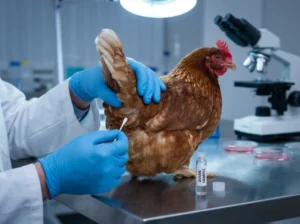As a responsible pet owner, ensuring the health and happiness of your dog is a priority. Dogs, often referred to as “fur babies,” rely on us to provide them with the best care. This article will guide you through essential tips to maintain your dog’s health, covering topics from diet restrictions to disease prevention using rapid detection kit.
Dietary Restrictions for Dogs
When it comes to feeding your dog, it’s crucial to understand that some human foods are harmful or even toxic to them. While we may be tempted to share our meals, certain foods can cause severe health issues in dogs:
Chocolate: Contains theobromine, which is highly toxic to dogs. Even small amounts can lead to vomiting, diarrhea, and in severe cases, seizures or death.
Onions and Garlic: These can damage a dog’s red blood cells, leading to anemia.
Grapes and Raisins: Known to cause kidney failure, even in small quantities.
Avocados: Contains persin, which can cause vomiting and diarrhea.
Bones and Fat Trimmings: Cooked bones can splinter and cause digestive tract injuries, while excessive fat can lead to pancreatitis.
To maintain a balanced diet, provide your dog with high-quality dog food designed to meet their nutritional needs. Fresh water should always be available, and treats should be given in moderation.
Daily Care and Grooming
Regular grooming is essential for a dog’s health and well-being. Depending on the breed, grooming routines will vary, but here are some general tips:
Brushing: Regular brushing helps to remove dead hair, distribute skin oils, and keep the coat shiny. It also helps prevent matting, especially for long-haired breeds.
Bathing: Dogs don’t need to be bathed as frequently as humans, but a bath every 4-6 weeks is recommended, depending on their coat type and activity level.
Teeth Cleaning: Dental hygiene is often overlooked but is crucial in preventing gum disease and tooth decay. Brush your dog’s teeth regularly with dog-safe toothpaste.
Ear Cleaning: Some breeds are more prone to ear infections. Regularly checking and cleaning their ears with a vet-approved solution can prevent infections.
Nail Trimming: Keeping your dog’s nails trimmed ensures they can walk properly and avoids painful splits or breaks.
Exercise and Mental Health
Dogs need regular physical and mental stimulation to stay healthy. The amount of exercise depends on the breed, age, and health of the dog, but here are some general guidelines:
Daily Walks: A minimum of 30-60 minutes of physical activity is recommended. This could be walking, running, or playtime at the park.
Mental Stimulation: Toys, puzzles, and games can help keep your dog’s mind sharp. Consider interactive toys or training sessions to keep your dog engaged.
Socialization: Regular interaction with other dogs and people helps prevent behavioral issues like aggression or anxiety.
Keeping your dog physically and mentally stimulated will contribute to its overall happiness and longevity.
Disease Prevention and Diagnostic Testing
Preventing diseases and keeping your dog in optimal health requires regular veterinary care and proactive measures. Some common diseases that affect dogs include:
Canine Distemper Virus (CDV): A highly contagious viral disease that affects the respiratory, gastrointestinal, and nervous systems.
Canine Parvovirus (CPV): This virus targets a dog’s intestines, causing severe vomiting and diarrhea, often leading to dehydration and death.
Heartworm Disease: Transmitted through mosquito bites, heartworms can cause life-threatening damage to a dog’s heart and lungs.
Lyme Disease: Spread by ticks, this disease can lead to fever, lameness, and kidney damage.
To detect diseases early, we at Sabervet offer reliable veterinary diagnostic test kits, such as coronavirus test kit, giardia test kit, canine heartworm test, lyme disease dog, etc. These kits can quickly and accurately diagnose various infections, such as CDV, CPV, and other diseases, using simple samples like blood or feces. Early detection is critical in preventing the progression of diseases and ensuring effective treatment. Using our rapid detection kit, veterinarians can identify infections swiftly, allowing for immediate intervention and improved outcomes.
Handling Special Situations
There are instances where dogs can encounter emergencies. Being prepared and knowing how to act can prevent serious consequences.
Heatstroke: Dogs are susceptible to heatstroke, especially in hot weather. Signs include excessive panting, drooling, vomiting, and weakness. If you suspect heatstroke, move your dog to a cooler area, offer water, and place cool (but not cold) towels on their body. Immediate veterinary care is essential.
Injury: Dogs can injure themselves through accidents, fights, or over-exertion. In case of injury, assess the severity. For cuts or scrapes, clean the wound with warm water and apply a bandage. For serious injuries like broken bones or severe bleeding, contact your vet immediately.
Poisoning: If your dog has ingested something toxic (e.g., human medications, household cleaners), contact your vet or a poison control hotline. Never induce vomiting without professional advice, as this can sometimes worsen the situation.
Pet Travel Tips
If you plan to travel with your dog, preparation is key to ensuring a safe and smooth journey.
Pre-Travel Checkup: Before traveling, take your dog to the vet for a health check and to ensure they are up-to-date on vaccinations.
Travel Supplies: Pack essentials such as food, water, bowls, toys, and any necessary medications. Make sure your dog has identification, including a microchip and a collar with your contact information.
Car Travel: Use a crate or a harness to secure your dog during car rides. Regular breaks for water, stretching, and bathroom needs are essential.
Air Travel: If flying, check the airline’s pet travel policies. Some airlines allow small dogs in the cabin, while larger dogs must travel in the cargo hold. Always choose an airline with a good reputation for pet safety.
Accommodations: Ensure your accommodation is pet-friendly and safe. Research local veterinarians in case of emergencies at your travel destination.
By planning ahead and following these tips, traveling with your dog can be an enjoyable experience for both of you.
Conclusion
Maintaining your dog’s health requires a combination of good dietary practices, regular grooming, sufficient exercise, disease prevention, and knowing how to handle emergencies. Additionally, with the availability of veterinary diagnostic test kits like those from Sabervet, detecting and preventing diseases early is more convenient than ever. Keeping your furry friend healthy and happy involves attention to both their physical and mental well-being, ensuring they enjoy a long, fulfilling life by your side.



